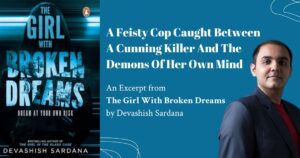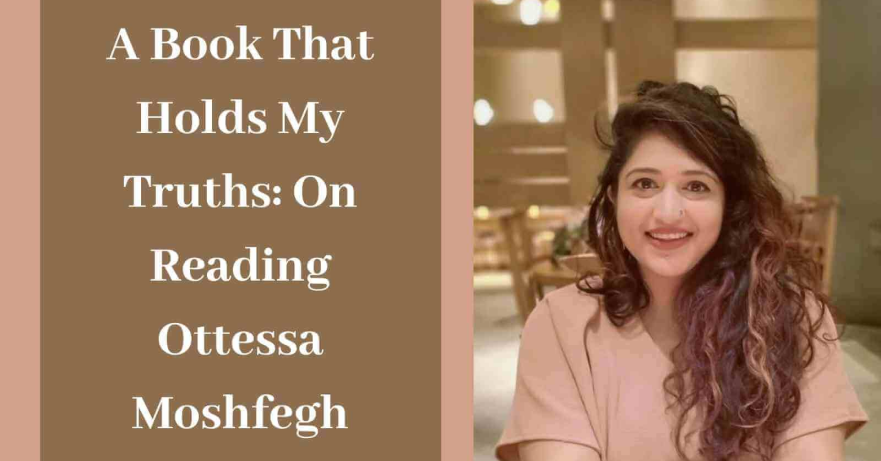Uma & Farzana
Mumbai, 2000
It is almost seven, but I am waiting for someone to wake us up. Good morning Uma, good morning. Time to wake up, my Sleeping Beauty.
If Uma Naidu were awake she might grimace, because though she is doing her bit, that is, sleeping, she is waiting, like Cinderella, for someone to do their bit and convince her that she’s beautiful.
Which she isn’t at the moment.
She is short, dark, on the chubby side of voluptuous, and has that South-Indian accent which makes everything she says just a little less significant. Uma is also fifteen, which is the optimal age for being ugly. Ugly Duckling, yes, that’s the name of the story. But Uma is sleeping, so I don’t fish the name out, as much as watch it darting by.
At Mount Mary High School, when Uma raises her hand in class the teachers often fail to notice her. Even her favourite teacher, Ruby-madam. It is as if she were invisible. Take last week’s English class on Emily Dickinson’s poem Much Madness Is Divinest Sense. Short poem, but as heavy as a Jersey cow’s udder.
‘What is Emily really trying to say?’ asks Ruby-madam looking around the classroom, unable, quite understandably, to see the invisible girl with the raised hand. ‘Come on students, wake up.’
“Uma is also fifteen, which is the optimal age for being ugly.”
When Uma complains to her Devyani-ammai about being invisible, her favourite aunt, who has come to visit for a short while, looks thoughtful. I felt the same way once, says Devyani-ammai, and then downloads into us some serious gyaan. According to stories, only boys get to become invisible. Girls are transformed into objects, quite visible objects. They are turned into mermaids, crones, stones, and pillars of salt. All quite visible. One might say, says Devyani-ammai, the point is their hideous visibility.
Then I whisper to Uma (which she quite hates) that if Devyani-ammai is so smart how come she is still unmarried? Uma whispers back (for the first time!) that (a) ammai is only thirty-five, so plennty of time, and (b) ammai is unmarried because she is smart. Hello, she even knows German! I am very proud of her.
Uma has wondered what she would like to turn into. Her bookshelf has a copy of A. K. Ramanujan’s The Flowering Tree, a collection of folktales, and the title story is all about the ‘malleable female body’, as Ruby-madam put it. In this heavy story, two sisters perform a ritual to help their impoverished Mother. The ritual requires two pitches of water. The first pitcher of water turns the Younger Daughter into a beautiful tree with fragrant flowers. The Elder Daughter plucks the flowers, weaves them into garlands, then she waters the tree with the second pitcher to turn her Younger Sister back into human form. The rest of the story is crap.
Sometimes when she takes her bath, Uma runs her dark hands over her budding frame, imagining how it would be to have heart-shaped leaves, roots, a slender trunk, branches for children to climb, and to bud fragrant flowers, blood-red and with long stamens and golden pollen.
But this morning, which is just like every other morning, Uma is in too much of a rush for such fictions. She has gotten up late—no one had come to awaken her after all—and in the tiny upstairs bathroom, which Uma shares with her elder sister, she is trying to brush her teeth, remove a zit, and gingerly toe-test the slowly filling bucket of boiling hot water all at the same time. Ow! She dips a whole foot in the water. What a klutz! She might as well be Sailor Moon.
“But this morning, which is just like every other morning, Uma is in too much of a rush for such fictions.”
‘I’m so sorry Sanae-san!’ giggles Uma, head lowered, tracing an arc on the wet floor with her toe, hands clasped demurely over her imaginary school-skirt. Strictly speaking, that’s the catch-phrase of Uma’s eye-patch-wearing heroine Reiki Yamanashi, not Sailor Moon. In Uma’s spare time— which she both has loads of and none at all—she and I like to write mash-up fan fiction.
A short digression for the Animeheads: Reiki is from a land whose mountains have been flattened by Respected December, a Brahmayogi Tyrant working incognito as an actuarial analyst for the sinister Yama corporation. Reiki’s eyepatch isn’t cosmetic. It is for other people’s protection, because Reiki’s left eye is now a Tyrant Eye and to gaze upon it is to be possessed by Respected December. Reiki has to make mountains out of molehills. Without mountains, there is no rain, without rain there is no harvest; well, long manga short, Reiki has to save her world. Meanwhile, on Earth, she has two right feet and two left shoes: O, the woes of being a dandere!
Uma would like to be Japanese. Not a shojo girl per se, since they’re so silly and helpless. And Uma likes being a girl, ergo she has no interest in being a Japanese boy. But she wouldn’t mind being Japanese. A short animadversion: an ugly duckling doesn’t take long to dress. But it is that time of the month—at least, it feels like it is going to be heavily symbolic. She has run out of sanitary napkins, which means having to ask her Elder Sister, but she’s having breakfast downstairs and their Father is at the table too. At least, his hairy arms are; the rest of his body can’t be seen through the railing. No use calling out to Elder Sister. It was kind of sad. Her best friend Farzana was so tight with her sister. The four of them could’ve had such fun together, just like in the Little Women movie. All the girls had managed to become little women without shedding a single drop of blood.
Uma steals a Whisper pad from her sister’s closet—as neatly arranged as the shelves in Akbarally’s—and darts back to her room. The sanitary pads are wider than Uma would like, and she knows, even as she folds and tucks the edges, that for the rest of the day she is going to feel like the time she had gone to school with wads of paper napkins stuffed into her pitiful bra. How the hell does Wonder Woman womanage menstruation?
As Uma sits down at the breakfast table, Devyani-ammai looks up from her journal and smiles. Father is watching TV news. When Uma wishes him good morning, he raises an impatient hand—the new budget is being media-raped and he doesn’t want to miss a minute of the fun. Devyani-ammai purses her lips but returns to her journal paper. Uma doesn’t like Fathers. Stories usually portray Fathers in a good light.
Then I tell Uma and Uma tells me that there are options. Atticus in To Kill A Mockingbird. She read the book twice, because the first time around she couldn’t find a single damn mockingbird. The second time she read it, Uma fell in love with Atticus. What a Dad!
“All the girls had managed to become little women without shedding a single drop of blood.”
Then there’s her favourite dad: Alicia Silverstone’s dad in Clueless. He had forearms covered with hair like a bear, and he was just as funny and cool and kind. He trusted his daughter. More than trusted; he depended on her. Uma had watched the movie several times, fast forwarding to the scenes between dad and daughter. Kindness, just kindness. That is the difference between Father and Dad.
No wonder Alicia Silverstone had turned out so bold, beautiful, and balanced. Uma wishes she were also a blonde, but when she had confessed the desire to Farzana, her friend claimed blonde pubic hair was low on a normal boy’s list of must-see attractions (this is untrue).
‘If only one out of ten boys is normal, and there’s only a five-percent chance a normal boy likes to munch on a blonde carpet, then what are your chances of hooking up, O Lilavati?’ ‘Doesn’t it depend on my preferences too?’ Uma had asked.
‘And the answer’s half of one percent.’
Uma is very good at math. So is Farzana. Farzana will let her talent go to waste, whereas I will ensure Uma won’t. But that isn’t important.
The important thing is that the normal boy in question is Raj Chowdhury. Decent at cricket. Cracks exams. Nice long fingers. But what makes him cool is that he has a published novel to his credit. The Teenager’s Guide To Not Growing Up. Zango Press. 120 pages. Rs. 150, Crossword Top 10, interview in The Times of India.
‘You’re spacing,’ says Elder Sister, and flicks a shrivelled little pea at her. ‘Who are you talking to?’
‘No one!’ “Spacing” isn’t even a real word. There is something very wrong with her sister.
‘Yeah, you were. It’s kinda pathetic. Live on Earth.’
To show Elder Sister she doesn’t care, Uma eats the pea. ‘Eww, that’s from last-night,’ says Elder Sister, crinkling her straight nose. ‘God knows how many cockroaches vomited on it.’
‘Be kind, mollu,’ says Devyani-ammai to Elder Sister.
“‘Yeah, you were. It’s kinda pathetic. Live on Earth.’”
Uma waits, hoping the pea will turn Elder Sister into a fire-breathing dragon. She needs toast with a wheatish complexion, and Elder Sister would go well with the slightly soggy omelet. Uma is six years younger than her sister, a temporal gap just large enough to be closed with a moral, namely: she, Uma,had been an accident. Which means she can’t possibly be The One, like Neo in The Matrix. Such characters are planned.
They are born with ready-made stories. They aren’t accidental arrangements of matter. The One is never from 402, 4th floor, Tilak Cooperative Housing Society, Chembur.
‘You’re spacing again,’ says Elder Sister.
Sisters are supposed to get along. The sisters in Little Women got along so well. Meg and Jo and Amy and poor, sad Beth. Uma identifies with Jo the most, but feels she is more likely to be cast as Beth.
Excerpted with permission from The Coincidence Plot, Anil Menon
Publishing/ Simon & Schuster (27 May 2023)
You can buy your copy here.
 Anil Menon’s most recent work is The Inconceivable Idea Of The Sun: Stories, a collection of his speculative short fiction. Menon’s Half of What I Say was shortlisted for the 2016 Hindu Literary Prize. He co-edited Breaking the Bow, an international anthology of short fiction inspired by the Ramayana. His debut YA novel The Beast With Nine Billion Feet was shortlisted for the 2010 Vodafone-Crossword award and the 2010 Parallax prize. His short fiction has been translated into many languages, including Chinese, Hebrew, Igbo, and Romanian. He currently serves as the editor-in-chief of The Bombay Literary Magazine.
Anil Menon’s most recent work is The Inconceivable Idea Of The Sun: Stories, a collection of his speculative short fiction. Menon’s Half of What I Say was shortlisted for the 2016 Hindu Literary Prize. He co-edited Breaking the Bow, an international anthology of short fiction inspired by the Ramayana. His debut YA novel The Beast With Nine Billion Feet was shortlisted for the 2010 Vodafone-Crossword award and the 2010 Parallax prize. His short fiction has been translated into many languages, including Chinese, Hebrew, Igbo, and Romanian. He currently serves as the editor-in-chief of The Bombay Literary Magazine.
Learn Fiction Writing with Bound










